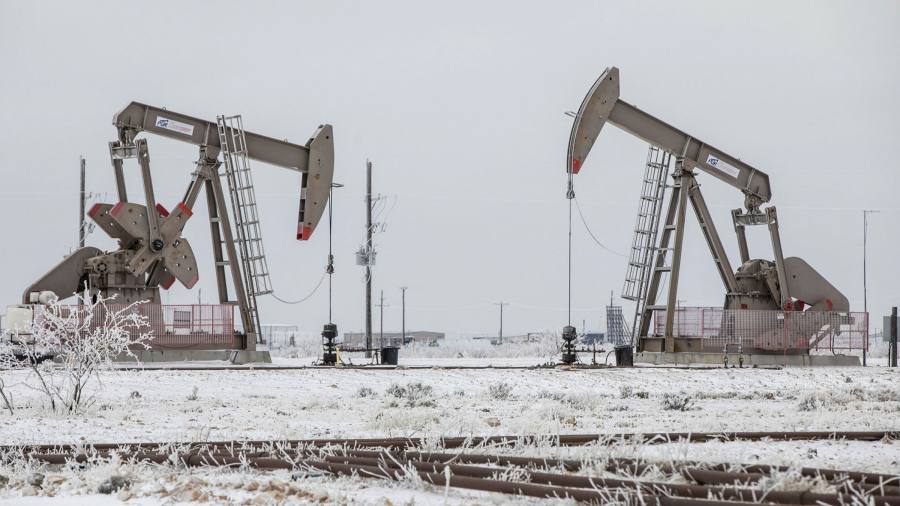[ad_1]
The oil and gas industry in Texas has buckled under the strain of a blast of Arctic weather that has disrupted a big pillar of the global energy market and sent crude prices to their highest levels in over a year.
US oil prices topped $61 a barrel in early trading on Wednesday, the highest level since last January, after about half of the oil supply was knocked out in Texas, the heart of the US energy industry.
S&P Global Platts estimated that as many as 3m barrels a day of oil output had been affected. The Permian basin, one of the world’s largest oilfields that accounts for more than a quarter of total US oil supply, is operating at well under half its normal capacity.
Frigid weather continues to grip Texas, where temperatures are expected to fall again on Wednesday night as authorities struggle to bring power generation back on to the system days after blackouts first started.
The Electric Reliability Council of Texas, the grid operator, said 46GW of power generation — more than half of the state’s total — remained offline as of Wednesday afternoon, little improved compared to Tuesday. Ercot officials said that blackouts were likely to continue for a couple more days.
Many Texans have been without power and heat for days amid the freezing snap and forced to seek refuge with friends and neighbours or in their cars. Some have taken shelter in one of the state’s “warming centers†— large facilities like convention centers or mega churches that still have power and are open to the public. About 2.9m households remain without power.
Facing a political backlash, Greg Abbott, Texas governor, has called for an investigation into Ercot’s handling of the blackouts, describing the grid operator as “anything but reliableâ€.
Texas is by far the country’s largest oil producer, and producers there have been crippled by lost power, iced equipment, frozen pipelines and impassable roads that have delayed repairs, analysts and operators say.
While the oil industry operates reliably in frigid climates from North Dakota to Siberia, most Texas producers have not made investments to weatherproof their equipment for sustained subfreezing temperatures, Parker Fawcett, an analyst at S&P Global Platts, said.
Climate Capital

Where climate change meets business, markets and politics. Explore the FT’s coverage hereÂ
Gas production in the US has also suffered a “historic†disruption as wells and pipelines have frozen and supply has crashed by 17bn cubic feet a day, mostly due to problems in Texas, forcing about 20 per cent of the nation’s total gas supply offline, according to IHS Markit, a consultancy.
The sharp drop in natural gas supply has fed a “negative feedback loop†that has forced natural gas generators offline, resulting in further reduction in power supply and production, Fawcett said.
The loss of natural gas supply has been a critical contributor to the blackouts in Texas, according to Bill Magness, chief executive of Ercot. “Getting those resources back on the grid is the central solution to getting people their power back,†he said.
The main gas price benchmark in the US has jumped more than 15 per cent since the start of the winter storm over the weekend to about $3.25 per million British thermal units by Wednesday afternoon.
Regional prices in Texas and Oklahoma, where supply has been severely disrupted, have seen far more extreme increases, in a potential boon for producers that have been able to keep operating.
The loss of supply threatens to reverberate across global energy markets given that the US gulf coast became a critical energy trading hub after the country’s shale boom fuelled rising exports.
Limited natural gas supply has been diverted away from exports to critical power and heating needs in Texas. Freeport LNG, a natural gas facility on the Gulf Coast, said in a regulatory filing that it received an order from Abbot’s administration to curtail exports from its facility.
Supply to the liquefied natural gas export plants in the US, which are mostly situated along the Gulf Coast, has fallen by nearly half in recent days to 5.5bn cubic feet a day, according to data from S&P Global Platts.
The US is now the world’s third-largest LNG exporter, behind Australia and Qatar, so if low supply persists the repercussions could be felt in gas markets around the world.
Officials in northern Mexico blamed blackouts there on curtailed natural gas supplies from pipelines that deliver gas into the country from the Permian basin. At the same time, US customers have had to turn to Canada for imports, which have reached multiyear highs in recent days.
Relief could come as soon this weekend when the cold spell is expected to break and temperatures are forecast to rise back well above freezing. But supply outages could persist for a couple more weeks “depending on the scale of the damageâ€, said Fawcett.
Twice weekly newsletter

Energy is the world’s indispensable business and Energy Source is its newsletter. Every Tuesday and Thursday, direct to your inbox, Energy Source brings you essential news, forward-thinking analysis and insider intelligence. Sign up here.
[ad_2]
Source link






